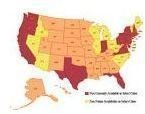What Does FiOS Stand For? An Overview of FiOS (Fiber Optics Service)
The Meaning of FiOS
Almost always, the first question that arises is what does FiOS stand for? FiOS is a term used to represent a proprietary group of voice, data and television transmission products offered by Verizon Communications. The FiOS trademark stands for “Fiber Optics Service” and Verizon alludes to the Greek meaning of the word which is “knowledge” according to their trademark application.
Understanding FiOS
Exactly what is FiOS? The FiOS infrastructure revolves around an extensive fiber optic network that exists in many areas of significant population. These cables are comprised of extremely thin glass fibers that are the approximate diameter of a human hair and are of near
optical purity. Data is sent through laser light pulses which allows for transmission over significant distances without a noticeable degrading of the signal itself. Since the cable is glass, it does not conduct electrical current or create a magnetic field. As a result, fiber optics are more stable, reliable and consistent than other forms of delivery.
FiOS is the first system to employ a Fiber to the Premises (FTTP) structure on a national basis. While fiber optic networks have been used by cable and telephone companies for some time, the actual fiber optic cabling is only used in the main lines. The connection from the central office to the customer’s home is still received over copper twisted or coaxial cable, bottlenecking the data and significantly reducing the transmission speeds. FiOS is currently the only commercially available data delivery process that is conducted entirely through fiber optic cabling.
FiOS Services
The primary advantage to FiOS is its superior ability to deliver high speed data for internet usage. In fact, in addition to better distance and signal integrity, fiber optic systems allow for incredible delivery speeds when compared to cable and DSL competitors. FiOS broadband offers premium service at download speeds of 50Mbps and upload speeds of 20Mbps. Cable’s best package include download speeds of 17Mbps while premium DSL service rates at 7Mbps.
FiOS television offers the same standard and high definition (HD) choices as cable and satellite in slightly different configurations and channel selections. One of the more interesting options FiOS offers is a multi room DVR that allows a single recording to play in up to six different rooms. DVR’s can also be programmed remotely through a variety of wireless phones. Pictures can be easily swapped between a PC and a TV, while Facebook and Twitter can also be accessed from the TV.
FiOS land line service is also available with unlimited calling plans starting at $39.95 and low cost international calling plan options as well.
Service Bundles
FiOS provides the the ability to bundle high speed data, TV, phone and even wireless together at a reduced rate. Verizon offers a myriad of bundle options that include different data delivery speeds, a wide array of channel and HD choices and numerous calling plans.
In fact, Verizon even offers a “make your own bundle” option if the choices they provide prove insufficient. FiOS prices are generally competitive with similar packages offered by cable or satellite competitors although it is important to compare specific features from each provider before purchasing.
Choosing FiOS
The only significant disadvantage to FiOS is limited availability. Fiber optic infrastructure is expensive to install and accessibility is geographically limited. Verizon currently offers FiOS service in 16 states with the intention to expand to all 28 states where it currently has business operations.
The ability of Verizon’s FiOS to deliver 100% fiber optic content into a home or business gives it a distinct advantage over satellite and cable competitors. The FiOS network offers exceptional quality and reliability and Verizon has emerged as a major provider for high speed data services.
